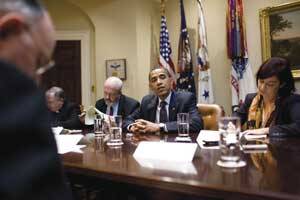In a wide-ranging interview with Catholic editors and religion reporters in advance of his July 10 meeting with Pope Benedict XVI, President Obama expressed his admiration for Catholic social teaching and the quality of its social action.
Mr. Obama voiced particular gratitude to the late Cardinal Joseph Bernardin of Chicago, the Catholic Campaign for Human Development and the Catholic parishes of southside Chicago, where he first worked as a community organizer in the 1980s. “Cardinal Bernardin was strongly pro-life,” the president said, “never shrank from speaking about that issue, but was very consistent in talking about a seamless garment and a range of issues that were part and parcel of what he considered to be pro-life, that meant he was concerned about poverty, he was concerned with how children were treated, he was concerned about the death penalty, he was concerned about foreign policy.”
The Catholic social tradition, President Obama added, “still impresses me,” and it can be a powerful force still in American society. Establishing a relationship with the bishops, the president commented, “is important to me because I have very fond memories of Cardinal Bernardin.... And so I know the potential that the bishops have to speak out forcefully on issues of social justice.”
President Obama was to meet with Pope Benedict following a meeting of G-8 leaders in L’Aquila, Italy, whose agenda was to include examining the impact of the world economic crisis on the poor. Promoting basic security for all at home and abroad, he said, should be a goal of the eight leading industrial countries. “I want to talk to the Holy Father about some core reforms not just overseas, but here in this country that assure basic security for individuals, the middle class as well as the poor.”
He continued, “I believe capitalism is the most effective means of generating wealth,” but it does not insure economic protection for all. By contrast, in the president’s estimation, “the Catholic Church has always been a powerful moral compass on questions of distribution and how we make sure that opportunities are extended to everybody. . . . And we want to build a society that is not only wealthy in the aggregate, but is also just.”
At L’Aquila, the president hoped the G-8 would review the commitments made in London at the G-20 summit last April. The United States has committed $100 billion to the I.M.F. to cushion the effects of the global economic recession on the world’s poor. The president also plans to double the U.S. contribution to world food security and direct U.S. development aid to poor countries toward agricultural development for the sake of food self-sufficiency. He also intends to press other wealthy nations for matching contributions to international food security as well.
President Meets With Religious Press
Show Comments (
)
Comments are automatically closed two weeks after an article's initial publication. See our comments policy for more.
The latest from america
Pope Francis warned against contemplative orders using defensive, nostalgic strategies “when it comes to reflecting on a whether a monastery should be saved or abandoned, on community life or about vocations.”
Gerard O’Connell and host Colleen Dulle analyze the reported forthcoming appointment of Archbishop Georg Gänswein, Benedict XVI’s longtime secretary and how it fits into the archbishop’s often publicly tumultuous relationship with Pope Francis.
A Homily for the Fourth Sunday of Easter, by Father Terrance Klein
Hybrid schools offer greater flexibility, which can allow students to pursue other interests like robotics or nature studies or simply accommodate a teenager’s preferred sleep schedule.








